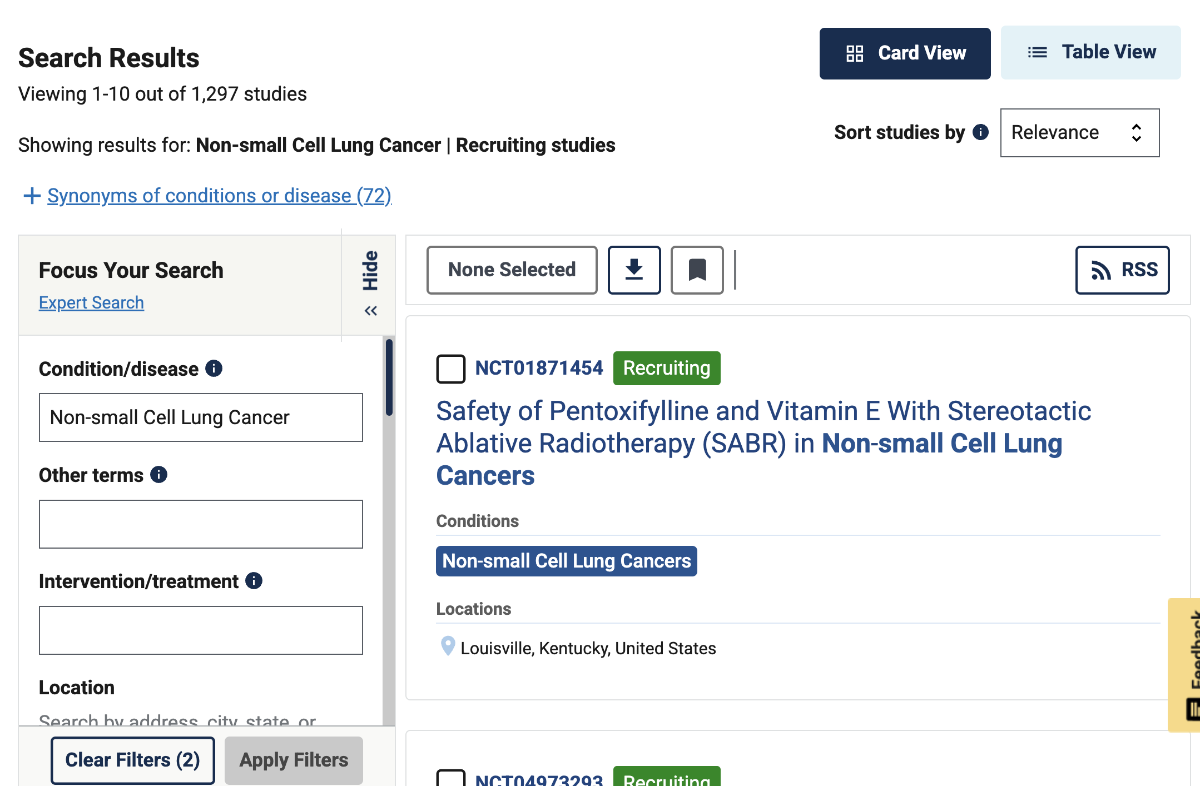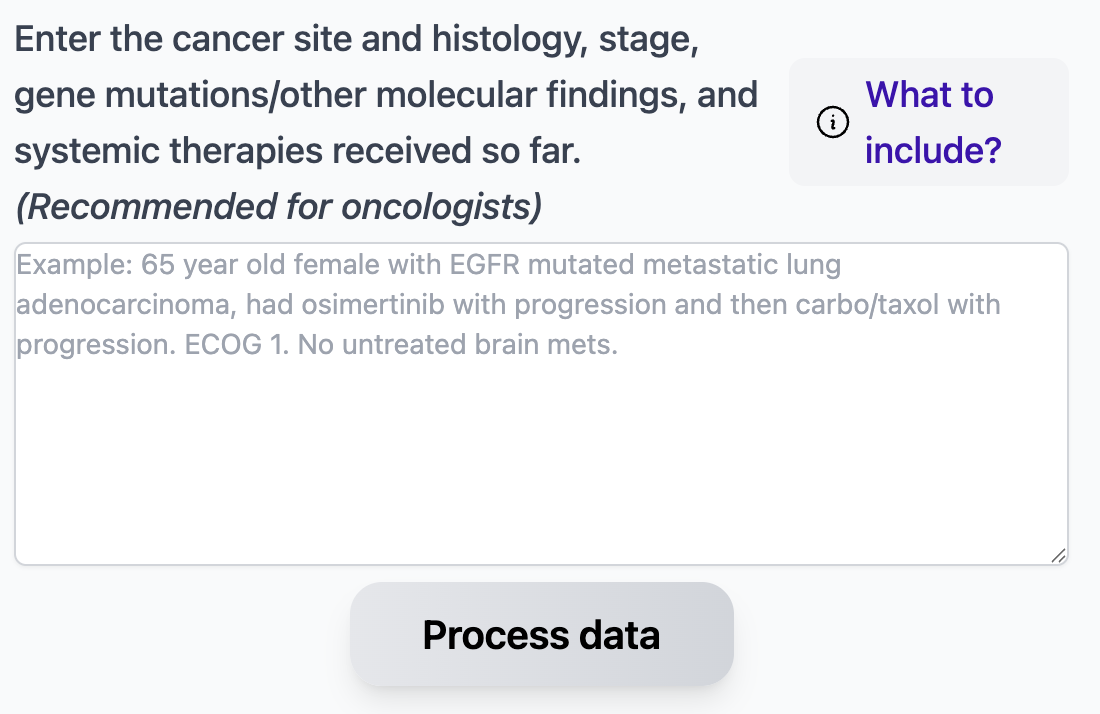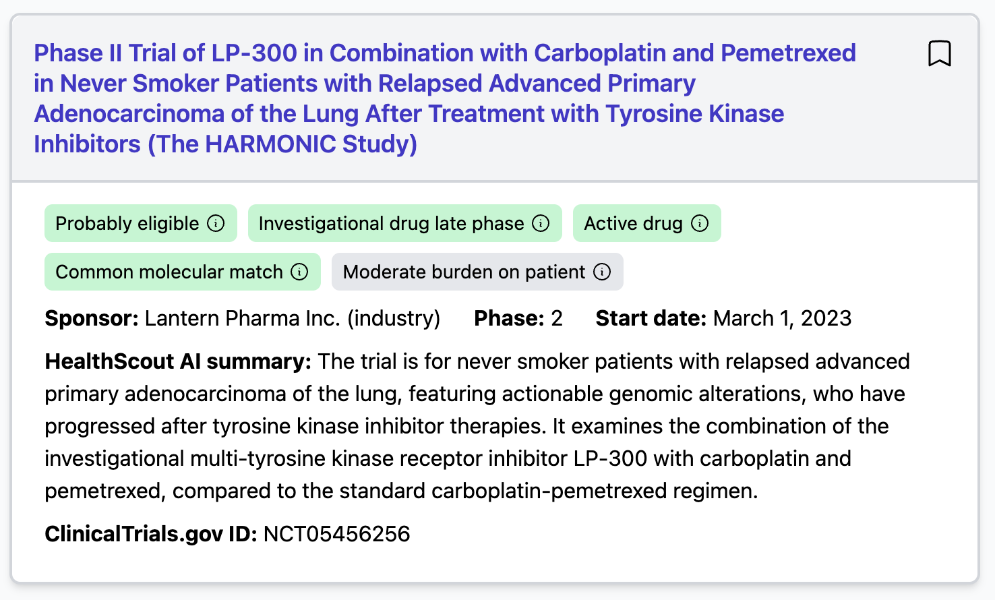Why HealthScout
April 27, 2025 Michael Gensheimer
The Beginning
The idea for HealthScout started when I was seeing a patient with an uncommon kind of cancer in my radiation oncology clinic. Their cancer had spread throughout the body and was growing despite drug treatments. Their medical oncologist had told them they did not know of any other good treatment options, but the patient was feeling strong and wanted to try something else. So they went to ClinicalTrials.gov and tried to look up clinical trials of new drug treatments that might be a good option for them. They came to the appointment with me having printed out the records for over 20 trials. Unfortunately, none of the trials were a good fit because they were for different cancer types or for people in a different situation. I myself was not an expert in the trials for this specific cancer type. After the visit, I spent a while searching for appropriate trials for the patient, found a few promising ones, and sent them to them. It was not easy to find even these few trials. I also suggested that they talk to the oncologist again about this or get a second opinion. While I was able to help this patient, the situation lingered in my head. There are so many new trials all the time and promising new treatments for cancer. There must be a better way to help patients and their doctors find trials that might be a good fit for them.
The Importance of Clinical Trials
Clinical trials of cancer treatments are vital to advance the field and improve survival for patients with cancer. New anticancer medications must be tested in a series of trials before being approved by health authorities for widespread use. There are many trials of exciting treatments available. In March 2025, there were 14,775 actively accruing interventional studies for cancer listed on ClinicalTrials.gov. More than 2,000 new oncology clinical trials started in 2023.
In 2024, the FDA approved more than 60 drugs for use in treating cancer (either new drugs or new uses of existing drugs). Those were all tested in trials before becoming broadly available. Trials help advance science and help future patients, and can also help control the cancer of the patients participating in the trials.
Unfortunately, in the United States, only about 7% of cancer patients enroll in therapeutic clinical trials. This low participation rate is a barrier to urgently needed progress and may deprive patients of treatments that could help them.
Challenges in Finding Trials
One reason for this disconnect is that the existing ways of finding promising trials don't work very well:
-
Oncologist Recommends: This might work well if the oncologist focuses on the patient's specific kind of cancer and is up-to-date on relevant trials. But most oncologists are generalists and will not always be aware of the latest trials for a specific condition. Also, trials are changing all the time, and it is impossible for any human to stay fully up-to-date on all of them. Finally, oncologists and their staff are extremely busy, and patients should not have to rely on their doctors going above and beyond and taking the extra time to find trials. If it takes the doctor an hour to find a few promising trials, they will not be able to do this consistently for every patient.
-
Patient Searches Independently: Several websites, like ClinicalTrials.gov, are great resources and contain a lot of information (in fact, HealthScout is built partially on data from ClinicalTrials.gov). But this information is very hard for patients to make use of. You can search for trials for breast or lung cancer, but then hundreds of trials show up in no particular order:

It is hard to filter them by other criteria, like looking for trials for a patient whose cancer grew after a certain medication. Even if the patient finds a trial that it looks like they're eligible for, it is hard to know if it's actually a good fit for them in terms of having a good chance of shrinking their cancer and matching their goals and values.
How HealthScout Helps
HealthScout solves many of these problems.
Determining Eligibility
Use the Free Text input to simply type in the patient's information in natural language. Our AI will process it and convert it into the structured format needed to match the trials. Because AI technology is not perfect, you have a chance to review the information for accuracy before seeing the matched trials.

Automatic Matching
We handle complex eligibility criteria, including trials with multiple cohorts. Here are some examples of criteria that we can handle:
- "Has received at least 1, but not more than 2, prior lines of treatment for advanced or metastatic NSCLC, 1 of which must be platinum-based chemotherapy."
- "The patient must have an ALK rearrangement but cannot have any other known actionable oncogenic drivers."
Large language models have gotten really good at thinking about text like this and turning it into computer code that the patient's data can be matched against. HealthScout would not have been possible even a few years ago, but the amazing pace of progress in AI has made it doable now. The AI is not perfect, which is why we have an oncologist manually verify every eligibility criterion to make sure the computer did a good job.
Finding the Right Fit
Just as important as knowing if a patient is eligible based on the criteria is whether the trial is actually a good fit for them. We use AI to get detailed information and analysis for each trial. This lets us put the trials that are the best match for the patient at the top of the list. Important features include:
- DNA mutations in the patient's cancer matching the trial's requirements
- Burden of visits/biopsies on the patient
- Proximity of the trial location to the patient
- And more...
The trial information page has details about all these factors.

We're Just Getting Started
We have a lot more planned, so please let us know about any feature requests or whether you found it useful!
Edited 8/28/2025
